Summary of Findings

In the aftermath of the failed Christmas Day terrorist attack on a Detroit-bound airliner, the government’s ratings for reducing the threat of terrorism have slipped. In addition, 33% now say that the ability of terrorists to launch a major attack on the U.S. is greater than it was at the time of 9/11; that is up only slightly from November but is the highest percentage expressing this view in surveys dating to 2002. The public also has become far more concerned that government anti-terrorism policies fail to protect the country adequately – and far less concerned that these policies restrict civil liberties.
Yet there is little evidence that heightened security concerns are affecting Barack Obama’s standing and image. At 49%, Obama’s job approval rating is unchanged from December. He continues to get markedly higher ratings for his handling of the threat of terrorism (51% approve) than for any other issue. And just 22% say his administration’s policies have made the country less safe from terrorism when compared with the policies of the Bush administration; that is virtually unchanged from June (21%).
The latest national survey by the Pew Research Center for the People & the Press, conducted Jan. 6-10 among 1,504 adults reached on cell phones and landlines, finds that fully 58% say that their greater concern about anti-terrorism policy is that the government has not gone far enough to protect the country; 27% say their greater concern is that the government has gone too far in restricting civil liberties. That represents a dramatic shift from just two months ago: In November, roughly equal percentages expressed concern about national security (40%) and civil liberties (36%).
For Obama, however, terrorism stands out as a strong suit, particularly when compared with his lackluster ratings for several key domestic issues. Just 38% approve of his handling
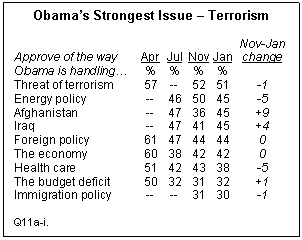
of health care policy while for the first time a majority (52%) disapproves. Obama receives even lower ratings for his handling of the budget deficit (32% approve) and immigration policy (30%). By contrast, Obama’s rating for handling the situation in Afghanistan has rebounded to 45%, up from 36% in November.
Obama’s personal ratings, on such dimensions as leadership, trustworthiness and effectiveness, remain strong. More than six-in-ten (62%) say they think of Obama as a strong leader, while just 32% say he is not a strong leader. Nearly as many say they think of Obama as trustworthy (61%) and able to get things done (57%). These perceptions have changed little since
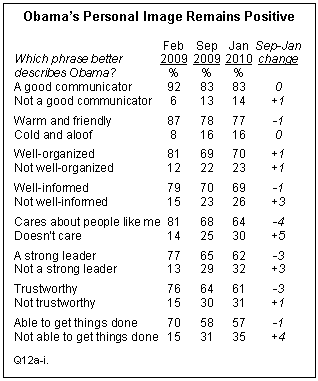
September, although Obama is not viewed as positively as he was in February 2009, shortly after taking office.
The survey finds that with the health care debate at a crucial stage, more people continue to generally oppose (48%) than generally favor (39%) the health care bills before Congress. Opinion about health care legislation has been stable in recent months.
In assessing the personal impact of health care legislation, relatively few say they expect their insurance coverage to improve should the measure become law. Fewer than half (39%) say their ability to get health insurance with a pre-existing medical condition would get better if the legislation becomes law; fewer (33%) expect they would be better able to obtain insurance if they change jobs or lose their job.
Views of the legislation’s potential impact on the cost and quality of health care are even more negative. Pluralities say
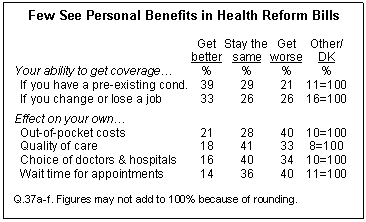
their out-of-pocket health care costs would get worse (40%) as a result of the legislation, while the same percentage says that wait times for medical appointments would get worse. Regarding the quality of health care they receive and choices of doctors and hospitals, pluralities expect no changes as a result of the legislation (41% quality of care, 40% choice of doctors). However, about twice as many people expect that these and other aspects of their own health care would get worse, rather than get better, if the proposed changes become law.
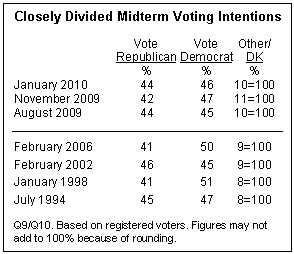
The survey finds that as 2010 begins, voters are evenly divided in their preferences on the so-called generic ballot: 46% say if the midterm elections were held today they would vote for a Democratic candidate for Congress in their district, or lean Democratic, while 44% say they would vote for a Republican or lean Republican. That represents little change from August 2009, but is a marked shift from the 2006 midterms when Democrats consistently held wide leads.
But this year’s midterms lag behind major sporting events – the Winter Olympics and the Super Bowl – on the list of the public’s most anticipated events in 2010: 61% say they are especially looking forward to next month’s Winter Olympics while 58% say they are especially looking forward to the Super Bowl; fewer (50%) say the same about the midterms. Smaller percentages say they are particularly looking forward to the Academy Awards (31%) and the World Cup soccer tournament (23%).
Not surprisingly, this year’s midterms are less highly anticipated than was the 2008 presidential election. In December 2007, fully 70% said they were looking forward to the presidential election, far more than said they were highly anticipating any other event in the year ahead.
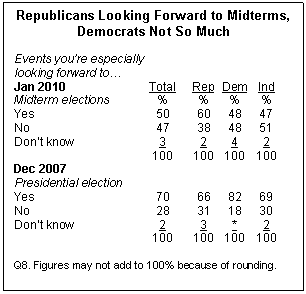
For Republicans, the midterms rank among the year’s top events. Fully 60% of Republicans say they are especially looking forward to the midterm elections; that is only somewhat fewer than the proportion of Republicans that said they were looking forward to the 2008 presidential election (66%). Among upcoming events, about as many Republicans are anticipating the midterms as are looking forward to the Olympics (64%) and the Super Bowl (60%).
Democrats, however, are not as eagerly anticipating this year’s elections: 48% say they are especially looking forward to the elections, while the same percentage says they are not. A little more than two years ago, 82% of Democrats said they were especially looking forward to the 2008 presidential election. When it comes to upcoming events, far more Democrats are looking forward to the Winter Olympics (63%) and Super Bowl (59%) than the elections.
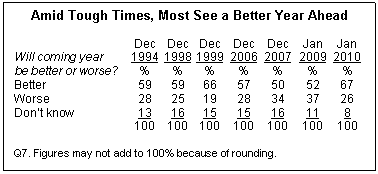
The survey finds that the national mood remains grim: 27% say they are satisfied with the way things are going in the country, a figure that has changed little since the summer. But there is considerable optimism that 2010 will be a better year than 2009 – 67% say the coming year will better, compared with 52% who said that last January and 50% in December 2007.
There are partisan differences in optimism about the coming year. More than eight-in-ten Democrats (83%) say 2010 will be better than 2009, compared with 60% of independents and 55% of Republicans. But positive assessments of the year ahead have risen among Democrats and Republicans alike: A year ago, 64% of Democrats and just 38% of Republicans said 2009 would be a better year than 2008.